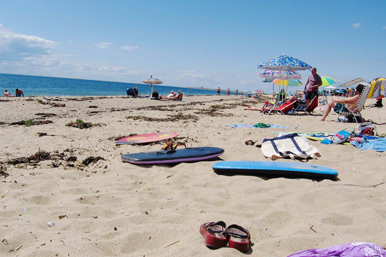The Incredible Shrinking Vacation
For Americans, it’s all work and no play

Swimsuit, beach towels, sunblock? Check. Laptop, BlackBerry, cell phone? Check.
If this sounds like your typical vacation packing list, you’re not alone. These days, working professionals are just as likely to hit the beach with their office gear in tow — if they leave the office at all.
An annual survey by Expedia.com reveals that 35 percent of employed U.S. adults aren’t taking all of their yearly allotted vacation days, and only 14 percent plan to take off a full two weeks. On average, Americans give up three days of vacation each year, according to the study. Not only that, they receive less vacation time to begin with than workers in every other country in the study.
To better understand this trend of vacation deprivation, BU Today spoke with Thierry Guedj, associate director of the Boston University Faculty and Staff Assistance Office (FSAO) and a Metropolitan College adjunct assistant professor of psychology, and Kathy Kram, a School of Management professor of organizational behavior and the school’s Everett W. Lord Distinguished Faculty Scholar.
BU Today: Why are vacations important?
Guedj: Vacations are necessary because people need a temporary break from the pressures of daily life. Without significant time off, these pressures can lead to burnout, which causes low moods, intense anxiety, and an inability to be productive at work. People suffering from overwork can become irritable and socially isolated, leading to relationship problems, including breakups or divorces.
Do you believe that Americans are overworked?
Guedj: Since the 1960s, the American workweek has grown steadily longer. Occupational stress, one of the main outcomes of overwork, has been on the rise for decades, and it’s a major cause of disability claims. Some employers are now actually requiring that their employees take vacation. Rested workers are better workers, because their attendance and productivity are better than that of their overworked counterparts.
Kram: Technology has really invaded people’s lives in ways I don’t think were ever fully anticipated, and I don’t think it’s healthy. Ongoing studies suggest that having balance in life makes one more effective in all areas. By not investing in only one domain, you’ll have more resistance when things go wrong, because your whole identity isn’t wrapped up in only one area.
Why do Americans work more hours than Europeans?
Guedj: In Europe, employers are legally required to give their employees four to six weeks vacation, depending on the country. In the United States, I do not believe there is any federal mandate that provides employees with paid vacation. Second, the attitudes toward taking vacation are very different. Europeans see vacations as a basic right, something that is widely accepted socially. Europeans who do not take monthlong vacations must justify to their friends and family why they would rather work!
Kram: Many companies in America have workaholic cultures. They assume the more hours people work, the more work gets done, and the harder people work, the more competitive the company will be in the global marketplace. This ethic leads many individuals to overwork. It’s ingrained in our culture, particularly among professionals. Status is very important. When you go to a cocktail party, the first question people ask is, what do you do?
Why don’t Americans take all the vacation they are entitled to?
Guedj: There are economic, structural, and psychological reasons. Some companies offer cash for vacation days that aren’t used. Some companies actually punish employees for taking time off by denying them promotions or pay raises. And there is also the case of the individual who perceives (rightly or wrongly) that the workplace cannot function without him or her.
Kram: This workaholic mentality often works from the top down. When employees see their senior managers working until eight at night, they feel they have to do the same. They worry that if they don’t mimic their managers’ work ethic, they won’t be promoted. Also, managerial jobs have gotten bigger as a result of company downsizing. Managers feel they can’t get away for that long— there’s just too much to be done.
So, are we getting more work done?
Guedj: The countries with the highest productivity levels in the world are France and Germany. In France, the most highly productive month of the year is September, which follows a month when a large part of the country is basically running on neutral. Within the United States, there’s a similar trend. Companies with more generous vacation packages have fewer workers’ compensation claims and fewer accidents in the workplace.
Kram: Studies of burnout indicate that when people work and work without taking time to rejuvenate, they get depressed and become less effective. Regular respite from work, combined with regular exercise and good self-care, allows people to perform better on the job.
What can be done to persuade more Americans to take their vacations?
Guedj: Americans don’t necessarily realize that vacations are not only good for their health, they’re also good for that of their coworkers, supervisors, and companies. Basically, by boosting worker job satisfaction and productivity, vacations are very good for the bottom line. If you want to change people’s vacationing behaviors, you can try to convince them by showing them research findings that challenge their deeply held views and beliefs that vacations are the enemy of productivity. Certainly the passing of more progressive legislation could have an important impact on people’s attitudes and behaviors. Everyone needs to realize that restful vacations are a necessity and not a luxury.
Vicky Waltz can be reached at vwaltz@bu.edu.